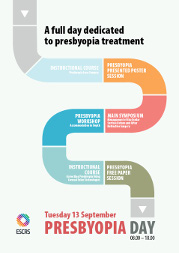Posters
Strabismus and binocular vision after refractive surgery
Poster Details
First Author: A. Martinez-Lajara SPAIN
Co Author(s): L. Gil Fernandez G. Garcia Guzman J. Mobayed
Abstract Details
Purpose:
To evaluate the effect on binocular vision and ocular alignment in patients undergoing refractive surgery.
Setting:
- Asociacion Para Evitar la Ceguera en Mexico - APEC
- Dènia Marina-Salud Hospital
Methods:
Prospective, longitudinal, observational study of 90 patients (180 eyes) undergoing refractive surgery. The photorefractive keratectomy (PRK) procedure was used in 9 cases, excimer laser-assisted in situ keratomileusis (LASIK) in 80 and intraocular lens (IOL) implant+ LASIK in one case. The ophthalmic examination included preoperative assessment of best-corrected visual acuity, subjective and cycloplegic refraction, motor status using alignment and ocular motility and sensory status by stereopsis and fusion, repeating examination a week, a month and at 3 months after surgery.
Results:
Refractive surgery generated a significant reduction (p = 0.007) of both stereopsis and visual acuity (VA) during the first weeks, recovering later. Significant correlation between VA and stereopsis was found. Patients with high ametropia (myopia ≥ 6 diopters, astigmatism ≥ 3dioptrías and hyperopia≥ 4 diopters) had lower preoperative stereopsis. In relation to motor status, only strabismic patients suffered significant changes (> 5 diopter prism) in the amplitude of the angle of deviation, with a tendency to decrease the angle. All of these patients showed a residual hyperopic.
Conclusions:
Refractive surgery alters binocularity in terms of stereopsis at least temporarily. Strabismic patients are more susceptible to modifications in the angle of deviation after refractive surgery. The residual refractive state can influence the change of the angle of deviation. We suggest a systematic study of binocular vision in patients about to undergo refractive surgery.
Financial Disclosure:
NONE





